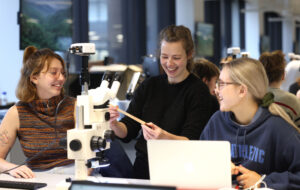How you'll learn
You’ll learn across a variety of teaching methods, like lectures, seminars, and hands-on workshops in the computer lab. Each module usually starts with a brief lecture by the module leader, followed by some independent research or computer-based exercises.
You’ll either work on these assignments on your own or in a group project. After that, you’ll present your findings to the other students and the module leader, which will lead to a group discussion. This is a formative exercise, so you may even get feedback from your peers on your presentation.
How you're assessed
Assessments in this programme will provide you with the opportunity to pursue avenues of these fields that are relevant to your particular interests and career aspirations. The assessment is therefore designed flexibly to provide student centred, research-led learning.
Assessment takes the form of short (~3000 word) reports, computational essays, oral presentations, computer exercises, examinations and a 12,000 maximum word dissertation.
Liverpool Hallmarks
We have a distinctive approach to education, the Liverpool Curriculum Framework, which focuses on research-connected teaching, active learning, and authentic assessment to ensure our students graduate as digitally fluent and confident global citizens.
The Liverpool Curriculum framework sets out our distinctive approach to education. Our teaching staff support our students to develop academic knowledge, skills, and understanding alongside our graduate attributes:
- Digital fluency
- Confidence
- Global citizenship
Our curriculum is characterised by the three Liverpool Hallmarks:
- Research-connected teaching
- Active learning
- Authentic assessment
All this is underpinned by our core value of inclusivity and commitment to providing a curriculum that is accessible to all students.









